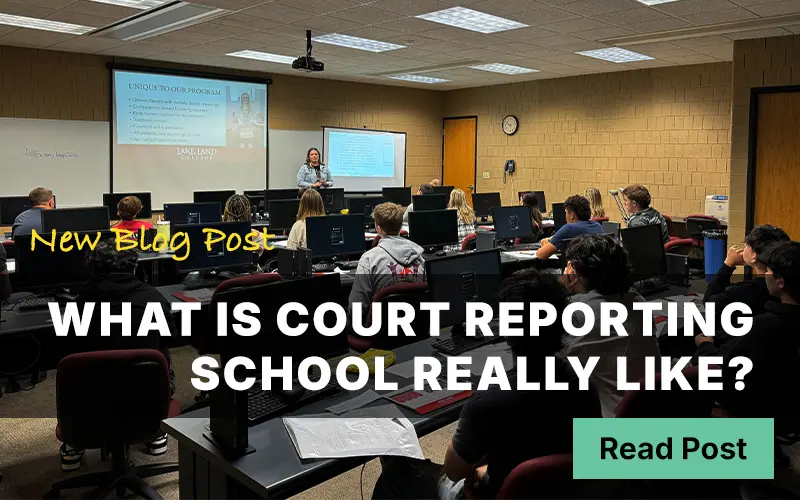
What Is Court Reporting School Really Like?
Posted: October 12th, 2025
If you’ve ever seen me reporting on Judy Justice, you may have wondered: What exactly does a court reporter do? And how do you even become one?
Court reporting is one of those fascinating, behind-the-scenes careers that keeps the justice system moving. But before you can sit in a courtroom or deposition capturing every word, you go through an intense, rewarding, and surprisingly exciting educational journey.
Let’s break down what court reporting school is really like, how it works, what it costs, what kind of classes you’ll take, and the opportunities waiting for you when you graduate.
How Court Reporting School Works
Court reporting programs are offered at specialized colleges and technical schools across the country. Some schools focus solely on stenography (using a steno machine), while others also teach voice writing (speech-to-text technology). Most programs are available both on-campus and online, giving students flexibility.
The biggest difference between court reporting school and traditional college? Instead of semesters built around essays and tests, much of your time is focused on skill mastery, specifically, building speed and accuracy on your steno machine or voice-writing software.
How Long Does It Take to Become a Court Reporter?
On average, it takes 2–4 years to complete a court reporting program. Unlike other degrees, the timeline depends less on credit hours and more on your personal progress in reaching speed requirements. Some students finish faster, while others take a little longer. It’s all about practice and consistency.
What Kind of Classes Do Court Reporters Take?
Court reporting school is a blend of technical training and academic classes. You’ll cover:
- Legal Terminology & Procedures – so you can understand what’s happening in court or depositions.
- English & Grammar – accuracy matters when creating a verbatim record.
- Medical Terminology – useful for depositions and cases with medical testimony.
- Speed Building – the heart of the program, where you practice every day to increase your writing speed.
Speed Building: The Core of Court Reporting School
Speed building classes are unlike anything else. Imagine playing an instrument. You practice scales, drills, and eventually full songs. Court reporting is similar, but instead of music, you’re writing down spoken words.
Students start at slower speeds (around 60 words per minute) and work their way up through drills and dictations. The goal? To reach 200 words per minute with 97.5% accuracy, the California standard for certification. Some states and certifications may require even higher speeds for certain exams.
How Much Does Court Reporting School Cost?
The cost varies depending on the program and whether you attend in-person or online, but generally you can expect:
- Tuition: $15,000 – $30,000 for the full program.
- Equipment: A steno machine or voice-writing software, computer, and textbooks (usually $3,000–$6,000).
- Exam & Certification Fees: A few hundred dollars per test.
While that may sound like an investment, many students find that court reporting school costs less than a traditional four-year degree—and leads directly into a well-paying, in-demand career.
Certification: The Final Step
After completing school, graduates take a state or national certification exam, depending on where they plan to work. Most exams require passing multiple speed tests at 180, 200, and 225 words per minute, as well as a written knowledge test.
Once certified, you’re officially ready to work as a court reporter.
Job Opportunities After Graduation
Here’s the exciting part: Court reporters are in high demand.
Graduates can pursue careers as:
- Official Court Reporters – working inside courtrooms.
- Freelance Reporters – covering depositions, arbitrations, and hearings.
- Captioners – providing live captions for TV broadcasts or events.
- CART Providers – offering real-time transcription for the deaf and hard-of-hearing community.
Court reporters enjoy flexible schedules, the ability to work independently, and excellent income potential. Many reporters earn six-figure incomes, especially those working in high-demand regions or in freelance roles with heavy workloads.
Why Court Reporting Is a Great Career
Court reporting isn’t just about typing, it’s about being at the center of history, law, and human stories. Every day brings something new, whether it’s capturing a dramatic trial, working on a high-stakes deposition, or captioning a live event for millions of viewers.
It’s challenging, yes—but also fun, rewarding, and full of opportunity. With court reporters in short supply nationwide, there has never been a better time to join the profession.
Thinking About Court Reporting School?
If you’ve ever dreamed of a career that’s flexible, respected, and impactful, court reporting might be the perfect fit. You’ll leave school with not just a skill, but a lifelong career path where the work is plentiful, the pay is strong, and the opportunities are endless.
At KW Court Reporting, we’re proud to not only serve attorneys and clients across California but also to inspire the next generation of reporters. Who knows, you might even find yourself reporting for television one day!
